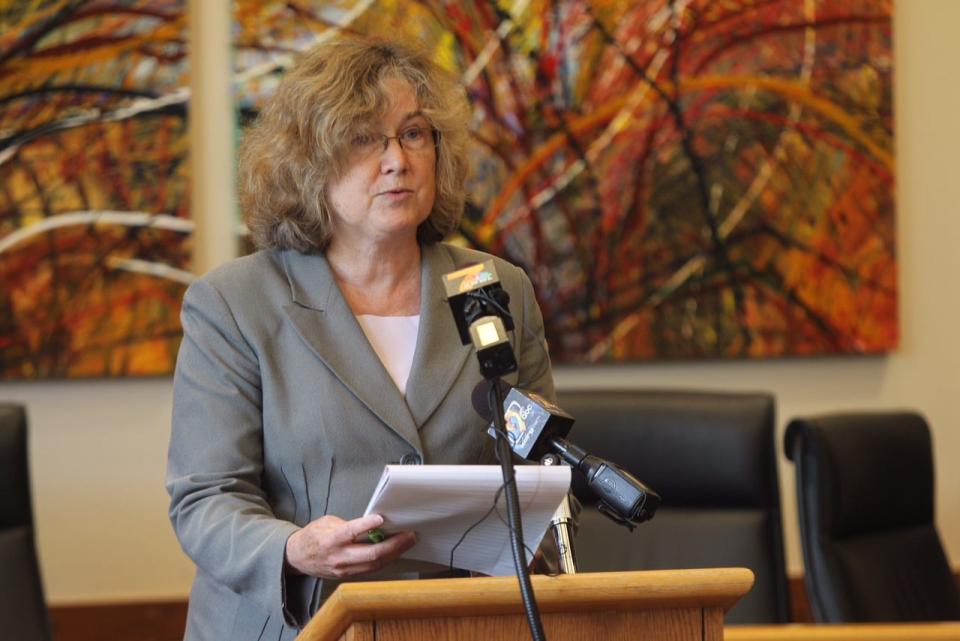Judge sentences BLM activist to two years of probation in Iowa City laser pointer case
A judge sentenced Black Liberation Movement organizer Maté Muhammad to deferred judgement and two years of probation Friday after he pleaded guilty to assaulting police officers by shining a laser pointer in their eyes in Iowa City in August 2020.
Iowa Sixth Judicial Associate Judge Jason Burns ruled after hearing testimony from Muhammad, his lawyer Rockne Cole and Johnson Count Attorney Janet Lyness. He announced his decision after laying out the sentencing guidelines, calling the five assault charges serious, but saying Muhammad has led an arrest-free life since the social justice protests in 2020.
"I truly believe it was not your intention to harm another person," Burns said. "But that doesn't mean that harm couldn't have happened, and in this case did happen."
Burns said he doesn't think the criminal justice system is supposed to be punitive, but rather protect the community and provide rehabilitation to people who need it. He said it was difficult for him to grant deferred judgement, but Muhammad's apology and efforts to remain arrest-free and continue working were important.
"I'm not convinced that the community is in danger from you, Mr. Muhammad. If anything I think some communities would greatly benefit from your participation or activism, and so that's not a concern for the court," Burns said.
"I could today put you in jail, but I don't think that really fixes anything."
Muhammad was also ordered to pay $535 in civil penalties on all five charges.
'It is regrettable': Muhammad apologizes, but worries about protesters being silenced
Muhammad, who was previously known as Matthew Bruce, pleaded guilty in June to five lesser charges out of the 15 original charges from his August 2020 arrest during a social justice demonstration at the home of the University of Iowa president. These charges include two counts of assault causing bodily injury, a serious misdemeanor, and three counts of assault, a simple misdemeanor.
Throughout the case, the severity of the charges gradually decreased from several felony charges to the misdemeanors. If the original charges stood, Muhammad could have faced years in prison.
Muhammad is co-founder of the Des Moines Black Liberation Movement, which has organized protests and community events in Iowa after George Floyd was murdered in Minneapolis by police officer Derek Chauvin in May 2020.
Before he was sentenced, Muhammad told the court it was never his intention to cause injury at the protest that day.
"I do deeply apologize that people were harmed. I think it is regrettable and not acceptable that people are still potentially dealing with the consequences of that," he said.
Muhammad told the Press-Citizen he was "very pleased" with the result of the trial and that the court did the right thing. He said he is still concerned for people in Iowa who want to take direct action through protest and could face charges for doing so.
"I'm not convinced anyone in the state of Iowa is free from repression," he said.
Muhammad told the court he has continued to organize and plan protests since 2020 and it has always been his intention to keep these events safe and peaceful. He said he is now employed fulltime at Wells Fargo and is finishing his education at the University of Iowa.
"I would like the opportunity to get a clean record, set things right and go back to the community and continue to serve and put my life on a direction it's supposed to go," he said.
The sentencing matched Cole's recommendation.
Cole said Muhammad took a leadership role in the Black Liberation Movement, and he intended to keep protests peaceful.
"He did cross a line in terms of what he is accepting responsibility for, but he wants to move on from that," Cole said.

Prosecutor: 'You do not engage in violence to oppose violence'
Lyness asked the court to sentence Muhammad to 180 days in jail, with all but 30 days suspended on two of the counts and an additional 30 days in jail on the other three counts. This would total 60 days in jail plus minimum fines, and one year of supervised probation.
"We do think it is appropriate to send a message that you do not engage in violence to oppose violence. It is not acceptable in this society," Lyness said.
"At the time that this event occurred, the officers were protecting the president of the university's residence from protesters and making sure the protesters were kept safe as well. They were there in a very much peace-keeping fashion. ... They were just standing back and the defendant chose to shine a laser in their eyes," she said.
Lyness argued that one of the officers who had a laser pointed at his eye has gone back annually for treatment for an injury and does not know whether his condition will worsen, possibly resulting in blindness.
"It's something he will have to check with for the rest of his life, because there was damage done to his eye," she said.
Lyness said a second officer experienced pain that caused temporary blindness and difficulty working the rest of that night. The other officers suffered short-term pain and Lyness said it disrupted their ability to do their job.
Burns replied that Muhammad was not being prosecuted based on possible outcomes, but what did happen. He also said the fact that the victims were police officers would not influence the sentencing because Muhammad did not plead guilty to the charges alleging he assaulted persons in certain occupations.
George Shillcock is the Press-Citizen's local government and development reporter covering Iowa City and Johnson County. He can be reached at (515) 350-6307, GShillcock@press-citizen.com and on Twitter @ShillcockGeorge
This article originally appeared on Iowa City Press-Citizen: Maté Muhammad gets 2 years probation in Iowa City laser pointer case

